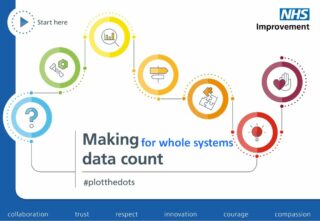Q Exchange
Making data count for whole systems
- Proposal
- 2019

What is the challenge your project is going to address and how does it connect to your chosen theme?
The NHS has recently made great progress in adopting SPC. A growing evidence base is emerging demonstrating the resulting positive impact on patient care. NHS Trusts have made the most progress to date. There is growing interest from commissioners and other partner organisations, however currently the knowledge base across different organisations is highly variable. This means that there is no common understanding of challenges, nor a common language and consistent approach to problem solving. There are key challenges that systems are facing across the NHS which would benefit from a consistent approach to analysing data across boundaries. Experience is that the use of SPC rather than traditional analytical approaches prompts different conversations focussed on the most important issues. This project would develop practical toolkits designed with people working in different parts of the health and social care system to enable them to solve their greatest local challenges.
What does your project aim to achieve?
This project aims to increase knowledge & capability of staff working in different parts of integrated care systems to enable the collective use of data in the most effective way (including SPC). Building on existing activities and resources, we will develop four interactive practical toolkits to lead people through a systematic approach to diagnose key problems (such as challenges with urgent care, long staying patients and challenges with workforce) through effective use of data. This will include identifying key data sets, creating dashboards, suggesting key areas for discussion & potential interventions based on good practice. Toolkits will include the ability to test out knowledge levels both before & after. Systems using the toolkits will be invited to complete a brief questionnaire or participate in telephone interviews. Producing practical guides to help solve some of the most challenging whole system problems provides good value to the health and social care system.
How will the project be delivered?
The project will be delivered by a virtual project group chaired by Samantha Riley. This groups will include a range of individuals working in different parts of the health and social care system with knowledge of different sectors. A number of these are named as part of this bid, other experts and partners will be involved as required dependent on the particular challenges selected for the toolkits. The views of Q members and twitter users will be sought to decide which key challenges toolkits should be developed for.
For each toolkit, a few systems will be identified to review and comment on the toolkits prior to wide scale distribution.
A project plan will be developed and the RAIDs (risks, assumptions, issues and dependencies) approach used to ensure that risks to the project are understood and mitigated where possible.
What and how is your project going to share learning throughout?
Case studies will be proactively sought to understand the impact of using the toolkits both with regards to changing local conversations but also solving problems. Case study templates will be developed and made available to make this process as easy as possible and video clips encouraged. A series of webexes will be established for each toolkit to both raise awareness of these new products and provide a platform for systems to share their experience and learning.
A series of blogs produced by the project team will be another mechanism to share learning – both quantitative and qualitative and including the statistics gathered regarding potential knowledge increase as a result of working through the toolkits.
Extensive use of twitter (using #plotthedots) will be used to share experience from across the country.
How you can contribute
- Input into the choice of topics for toolkit development
- Expert input
- Raising awareness of the project and its benefits
- Seeking out case studies
- Promoting SPC as an approach and the existing resources and materials available
- Facilitating use of the toolkits within local systems
Plan timeline
| 22 Dec 2019 | Topics for toolkits agreed |
|---|---|
| 27 Mar 2020 | Toolkit 1 developed |
| 6 Apr 2020 | Toolkit 1 tested |
| 17 Apr 2020 | Toolkit 1 published |
| 5 Jun 2020 | Toolkit 2 published |
| 21 Aug 2020 | Toolkit 3 published |
| 4 Dec 2020 | Toolkit 4 published |
Comments
Wendy Lewis 22 Jul 2019
this is a great progression from the hugely successful initial Q Exchange project. The application of Making Data Count methodology and the refreshing approach to dissemination has a huge amount to offer health and care systems coming together to understand their data and identify system improvements.
I would support the project from a QI application with systems perspective.
Anna Burhouse 2 Jul 2019
Dear team,
So pleased to see this natural next step for making data count. Would happily input into the thinking and evaluation.
I wondered about how to better capture experience measures too for systems (staff and patients) What do you think?
Warm wishes
Anna
Comments are now closed for this post.